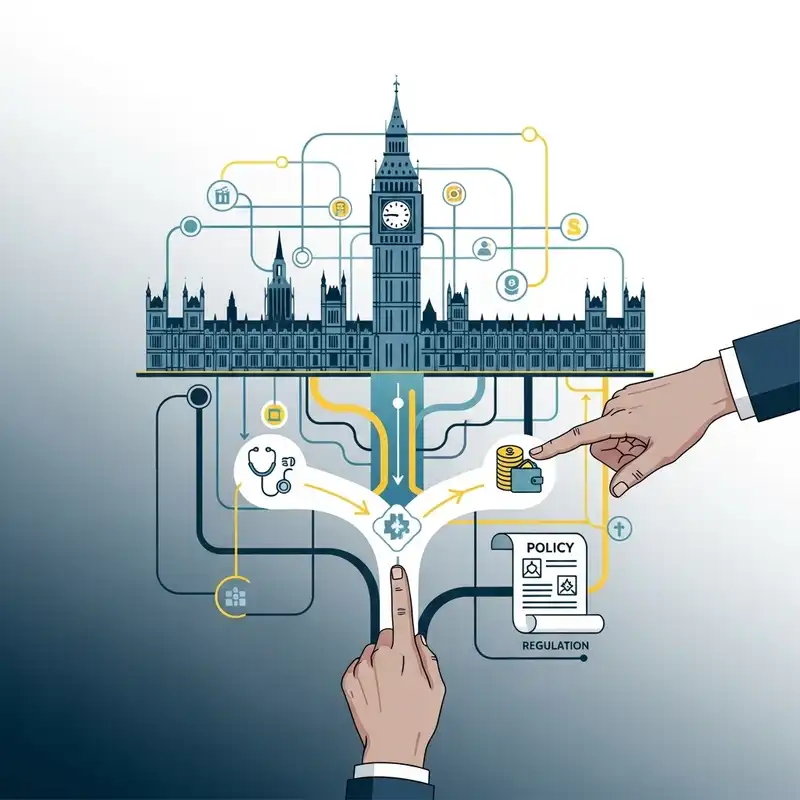TL;DR
As an FCA-authorised broker that has arranged over 900,000 policies, WeCovr provides expert insight into the evolving world of private medical insurance in the UK. This article explores how Artificial Intelligence (AI) is not just a buzzword, but a powerful force reshaping healthcare, from your smartphone to the hospital scanner.
Key takeaways
- Artificial Intelligence (AI) is the broadest concept. It's any technology that enables a computer to mimic human intelligence, like problem-solving or learning.
- Machine Learning (ML) is a subset of AI. Instead of being explicitly programmed for a task, a machine 'learns' from vast amounts of data. It identifies patterns and makes predictions based on them. For example, it could analyse thousands of patient records to predict which individuals are at high risk of developing a certain condition.
- Deep Learning is a more advanced subset of ML. It uses complex, layered structures called 'neural networks'—inspired by the human brain—to analyse data in a more sophisticated way. This is the technology behind facial recognition and, in healthcare, the analysis of complex medical images like X-rays and MRI scans.
- Acute Condition: A disease, illness, or injury that is likely to respond quickly to treatment and lead to a full recovery. It's usually short-lived and unexpected. Examples include a joint sprain, appendicitis, a cataract, or a hernia.
- Chronic Condition: A disease, illness, or injury that has one or more of the following characteristics: it needs ongoing or long-term monitoring, requires long-term management or medication, has no known cure, or is likely to recur. Examples include diabetes, asthma, arthritis, high blood pressure, and Crohn's disease.
As an FCA-authorised broker that has arranged over 900,000 policies, WeCovr provides expert insight into the evolving world of private medical insurance in the UK. This article explores how Artificial Intelligence (AI) is not just a buzzword, but a powerful force reshaping healthcare, from your smartphone to the hospital scanner.
WeCovr examines how artificial intelligence is transforming healthcare delivery in the UK
Artificial Intelligence is quietly becoming one of the most significant revolutions in modern medicine. Once the realm of science fiction, AI is now a practical tool being integrated into the NHS and private healthcare sectors to improve accuracy, speed, and access to care. From AI-powered symptom checkers that offer instant guidance to advanced algorithms that can spot diseases earlier than the human eye, this technology is changing the patient journey from the ground up.
In this comprehensive guide, we'll break down what AI in healthcare really means for you. We'll explore its role in diagnostics, its integration with private health cover, and what the future holds. Most importantly, we'll clarify how this technology fits within the framework of UK private medical insurance, including the crucial distinction between acute and chronic conditions.
What is AI in Healthcare? A Plain English Guide
You might hear terms like 'Artificial Intelligence', 'Machine Learning', and 'Deep Learning' used interchangeably, but they have distinct meanings. Think of them as Russian nesting dolls.
- Artificial Intelligence (AI) is the broadest concept. It's any technology that enables a computer to mimic human intelligence, like problem-solving or learning.
- Machine Learning (ML) is a subset of AI. Instead of being explicitly programmed for a task, a machine 'learns' from vast amounts of data. It identifies patterns and makes predictions based on them. For example, it could analyse thousands of patient records to predict which individuals are at high risk of developing a certain condition.
- Deep Learning is a more advanced subset of ML. It uses complex, layered structures called 'neural networks'—inspired by the human brain—to analyse data in a more sophisticated way. This is the technology behind facial recognition and, in healthcare, the analysis of complex medical images like X-rays and MRI scans.
In the UK, the NHS holds one of the most comprehensive health datasets in the world. AI and ML algorithms can sift through this anonymised data to uncover insights that would be impossible for humans to find, leading to breakthroughs in diagnostics, treatment plans, and public health strategy.
The Rise of AI-Powered Symptom Checkers: Your Pocket GP?
For years, 'Dr. Google' has been the first port of call for many when a new ache or pain appears. This often leads to a spiral of anxiety and misinformation, a phenomenon known as 'cyberchondria'. AI-powered symptom checkers are the sophisticated, responsible evolution of this impulse.
Instead of you typing symptoms into a search bar, these apps engage you in a dynamic conversation. They ask a series of questions, much like a GP or an NHS 111 operator would, adapting the questions based on your previous answers.
Benefits of AI Symptom Checkers:
- 24/7 Accessibility: Get immediate guidance at any time of day or night, which can be incredibly reassuring.
- Efficient Triage: The primary goal is not to diagnose, but to triage—to guide you to the right level of care. The outcome might be 'manage at home', 'see a pharmacist', 'book a non-urgent GP appointment', or 'go to A&E now'. This helps reduce unnecessary strain on GP surgeries and emergency services.
- Reduced Anxiety: By providing a structured, logical assessment, these tools can offer clarity and calm fears driven by unstructured web searches.
- Integration with Healthcare Services: Many apps are now integrated with booking systems, allowing you to schedule a follow-up appointment with a GP or digital health provider directly. Many private medical insurance UK policies now include access to these digital GP services as a core benefit.
How AI Symptom Checkers Compare to a Web Search
| Feature | Traditional Web Search ("Dr. Google") | AI-Powered Symptom Checker |
|---|---|---|
| Interaction | Static, one-way information delivery. | Interactive, conversational, and adaptive. |
| Personalisation | Generic results based on keywords. Not tailored to your age, sex, or medical history. | Asks for personal details to provide a more tailored and relevant assessment. |
| Triage | Offers no clear next steps. Can suggest everything from a minor issue to a terminal illness for the same symptom. | Provides a risk-based recommendation for your next step (e.g., self-care, pharmacy, GP, A&E). |
| Reliability | Highly variable. Results are ranked by search engine algorithms, not clinical accuracy. | Based on clinical protocols and trained on vast medical datasets. While not infallible, they are far more structured. |
While these tools are incredibly useful, they are not a substitute for a qualified medical professional. They are a starting point—an advanced triage system to guide your next steps.
AI in Medical Diagnostics: Seeing What the Human Eye Might Miss
Beyond symptom checkers, AI's most profound impact is in the field of clinical diagnostics. Deep learning algorithms are being trained to analyse medical images with a level of detail and speed that can augment, and sometimes exceed, human capability.
This isn't about replacing doctors; it's about providing them with super-powered tools to make better, faster decisions.
Key Areas of AI-Driven Diagnostics:
- Radiology (Medical Imaging): This is where AI is most established. Algorithms can screen X-rays, CT scans, and MRIs, flagging potential abnormalities for a radiologist to review. This acts as a second pair of eyes, reducing the chance of human error and speeding up the review process. A landmark study published in The Lancet Oncology in 2023 found that an AI-supported screening process for breast cancer was safe and could reduce the workload of radiologists by almost half.
- Diabetic Retinopathy: AI tools can analyse images of the back of the eye to detect early signs of diabetic retinopathy, a leading cause of blindness in working-age adults. This allows for earlier intervention and can be deployed in community settings, making screening more accessible.
- Pathology: Traditionally, pathologists spend hours looking at tissue samples under a microscope to identify cancer cells. AI can now pre-scan these digital slides, highlighting areas of concern and even quantifying cell types, making the pathologist's job more efficient and accurate.
- Cardiology: AI algorithms can analyse electrocardiograms (ECGs) to detect subtle signs of heart conditions, like atrial fibrillation, that might be missed during a routine check-up.
This technology is crucial for the future of both the NHS and private healthcare. It helps manage workloads, shorten waiting times for test results, and ultimately leads to earlier diagnosis, which is one of the most significant factors in improving patient outcomes, especially for conditions like cancer.
How AI is Enhancing the UK Private Medical Insurance Experience
Providers of private medical insurance UK are actively embracing AI to deliver a more responsive, personalised, and preventative service to their members. The focus is shifting from simply paying for treatment to helping members stay healthy and access care more efficiently when they need it.
1. Digital GP and Triage Services
Virtually all leading PMI policies now offer a 'Digital GP' or 'virtual GP' service. These services often use AI-powered symptom checkers as the first step to triage your issue before you speak to a doctor via video call. This ensures you're directed to the right place and that the GP already has a summary of your condition, making the consultation more effective.
2. Wellness and Preventative Health
The best PMI providers understand that prevention is better than cure. They are increasingly using AI-driven apps and platforms to encourage healthy lifestyles.
At WeCovr, we believe in empowering our clients. That's why clients who purchase private medical insurance or life insurance through us receive complimentary access to CalorieHero, our AI-powered calorie and nutrition tracking app. By helping you manage your diet and make healthier choices, we aim to support your long-term wellbeing.
3. Streamlined Claims and Authorisation
The claims process, once a cumbersome paper-based affair, is being transformed by AI. Algorithms can now help process claims and pre-authorisation requests for treatment much faster. By analysing the request against the policy terms and clinical codes, AI can grant immediate approval for many standard procedures, meaning you get the green light for your treatment without delay.
4. Future Personalisation
Looking ahead, AI holds the potential to create more personalised insurance products. By analysing anonymised population data, insurers could better understand health risks and potentially offer cover that is more closely tailored to an individual's lifestyle and needs (always within strict regulatory and ethical guidelines).
As an expert PMI broker, WeCovr stays at the forefront of these technological advancements. We help our clients understand the features of modern policies, from digital GP access to wellness benefits, ensuring they choose a plan that offers real-world value.
Understanding Your Cover: AI, PMI, and the Rule of Acute vs. Chronic
This is the most important section for anyone considering private health cover in the UK. While AI is making healthcare more advanced, the fundamental principles of insurance remain the same.
UK private medical insurance is designed to cover acute conditions that arise after you take out your policy.
It is crucial to understand the difference between acute and chronic conditions.
- Acute Condition: A disease, illness, or injury that is likely to respond quickly to treatment and lead to a full recovery. It's usually short-lived and unexpected. Examples include a joint sprain, appendicitis, a cataract, or a hernia.
- Chronic Condition: A disease, illness, or injury that has one or more of the following characteristics: it needs ongoing or long-term monitoring, requires long-term management or medication, has no known cure, or is likely to recur. Examples include diabetes, asthma, arthritis, high blood pressure, and Crohn's disease.
Crucially, standard private medical insurance policies DO NOT cover pre-existing conditions or chronic conditions.
A pre-existing condition is any ailment you have sought advice or treatment for in the years before your policy starts (typically the last 5 years). The reason for this exclusion is to keep private health cover affordable for the majority. Insuring long-term, predictable, and ongoing costs for chronic conditions would make premiums prohibitively expensive for everyone.
The NHS provides excellent care for chronic conditions, and PMI is designed to work alongside it, giving you fast access to treatment for new, acute problems.
Acute vs. Chronic Conditions: A Clear Comparison
| Condition Type | Example | Is it typically covered by PMI? |
|---|---|---|
| Acute Condition | You develop painful gallstones and need surgery to remove your gallbladder. | Yes. This is a classic example of an acute condition that PMI is designed for. |
| Pre-existing Condition | You were diagnosed with and treated for knee pain two years before buying your policy. | No. This is a pre-existing condition and would be excluded from cover. |
| Chronic Condition | You are diagnosed with Type 1 Diabetes after your policy starts. | No. While the initial diagnosis might be covered, the long-term management of this chronic condition (insulin, check-ups) is not. |
| Acute Flare-up of a Chronic Condition | You have long-term asthma (chronic) but suffer a sudden, severe, and unexpected asthma attack. | This is a grey area and depends heavily on the policy. Some may cover the acute emergency treatment, but not the ongoing management of the underlying asthma. |
An AI symptom checker might help you identify symptoms, but whether the resulting treatment is covered by your PMI depends entirely on whether the condition is acute and new, not on how it was diagnosed.
The Future of AI in UK Healthcare: Predictions for 2030 and Beyond
The progress we've seen so far is just the beginning. The integration of AI into healthcare is set to accelerate, bringing changes that will benefit patients, clinicians, and the health system as a whole.
- Predictive Analytics: AI will be used to forecast health trends. For example, it could predict flu outbreaks by analysing symptom checker data and public transport usage, allowing the NHS to allocate resources more effectively. It could also identify patients in hospital who are at high risk of sudden deterioration, enabling proactive care.
- Hyper-Personalised Medicine: By combining genomic data, lifestyle information from wearables, and clinical records, AI could help create truly personalised treatment and prevention plans. Your medicine and health advice would be tailored specifically to you.
- AI-Assisted Surgery: Robots are already used in surgery, but the next generation will be more autonomous. An AI-assisted robot could perform routine parts of an operation with superhuman precision, freeing up the surgeon to focus on the most critical stages.
- Accelerated Drug Discovery: Developing new drugs is an incredibly slow and expensive process. AI can analyse molecular structures and biological data at a massive scale to identify promising new drug candidates much faster, potentially leading to new treatments for diseases that are currently incurable.
Ethical and Regulatory Hurdles
This exciting future also comes with challenges that need careful management. Key ethical considerations include:
- Data Privacy and Security: Protecting sensitive patient data is paramount.
- Algorithmic Bias: If an AI is trained on data that is not diverse, it could perpetuate or even amplify existing health inequalities.
- Accountability: If an AI makes a diagnostic error, who is responsible? The doctor, the hospital, or the software developer?
- The Human Touch: Ensuring that technology enhances, rather than replaces, the essential human element of compassion and empathy in care.
UK regulators like the Medicines and Healthcare products Regulatory Agency (MHRA) are developing robust frameworks to ensure that any AI tools used in healthcare are safe, effective, and ethical.
Beyond Insurance: WeCovr's Commitment to Your Health and Wellness
At WeCovr, our role goes beyond simply helping you find the best PMI provider. We see ourselves as your partner in health. We believe that modern financial services should offer tangible, everyday value.
That's why we provide our clients with tools to support their health goals. As mentioned, our CalorieHero AI app is available at no extra cost to our PMI and life insurance clients, offering a simple way to build healthier eating habits.
Furthermore, we believe in providing comprehensive financial protection. Clients who purchase private medical insurance through WeCovr can also benefit from discounts on other policies, such as life insurance or income protection. This integrated approach ensures all aspects of your wellbeing are looked after. With consistently high customer satisfaction ratings, our focus is on providing clear, impartial advice to help you navigate the complexities of the insurance market.
Does private medical insurance cover conditions diagnosed by an AI symptom checker?
Will using an AI health app or symptom checker affect my private health insurance premiums?
Why doesn't private medical insurance cover chronic conditions like diabetes or arthritis?
What happens if an AI diagnostic tool makes a mistake?
The world of healthcare is changing rapidly, with AI at the helm. Understanding how these innovations work and how they fit with your health cover is key to making empowered decisions.
Ready to explore your options for private medical insurance? The expert team at WeCovr is here to help. We'll compare leading UK insurers to find a policy that fits your needs and budget, all at no cost to you. Get your free, no-obligation quote today.
Sources
- NHS England: Waiting times and referral-to-treatment statistics.
- Office for National Statistics (ONS): Health, mortality, and workforce data.
- NICE: Clinical guidance and technology appraisals.
- Care Quality Commission (CQC): Provider quality and inspection reports.
- UK Health Security Agency (UKHSA): Public health surveillance reports.
- Association of British Insurers (ABI): Health and protection market publications.

































